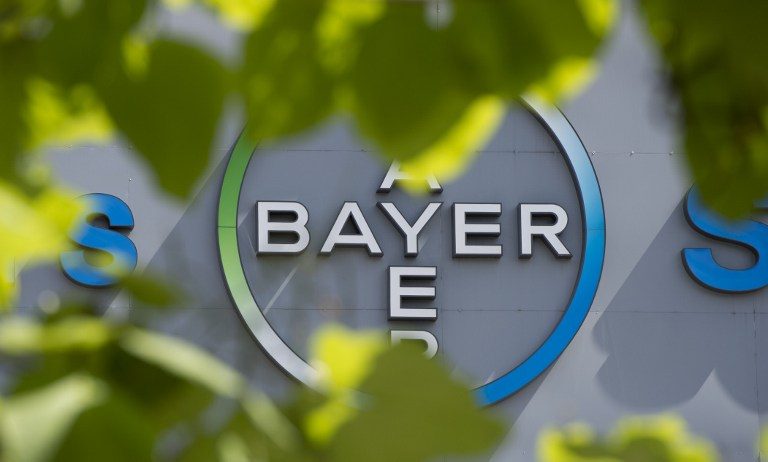SUMMARY
This is AI generated summarization, which may have errors. For context, always refer to the full article.

BERLIN, Germany (4th UPDATE) – German chemicals giant Bayer said Monday, May 23, it had offered $62 billion for US agriculture group Monsanto as it seeks to create the world’s biggest supplier of seeds, pesticides, and genetically-modified crops.
In the biggest takeover ever attempted by a German company, Bayer said it made an offer for the US giant at $122 per share in cash, or a total of $62 billion (55 billion euros).
The move spells a public relations risk for Bayer, especially in Germany, where popular skepticism is high of GM crops and the practice of patenting plant varieties, and where controversy has flared about the health risks of glyphosate, a pesticide which Monsanto markets as Roundup.
Leverkusen-based Bayer promised that “the planned combination with Monsanto is such an extraordinary opportunity to create a global leader in the agricultural industry. Monsanto is a perfect match to our agricultural business.”
Bayer CEO Werner Baumann said the company would have to “decisively address the point of reputation and challenges of Monsanto in Europe,” adding that “our brand stands for responsibility, transparency, and openness.”
The German firm said it expected synergies from the merger – the biggest announced this year to date in the world – to boost annual earnings by around $1.5 billion after 3 years.
The announcement came just days after Saint Louis, Missouri-based Monsanto said it had received an unsolicited bid from Bayer following weeks of speculation about a possible tie-up.
Monsanto has said it “will have no further comment until its board of directors has completed its review” of the offer.
Bayer shares, which fell last week on news of the proposal, dropped another 5.7% to 84.42 euros Monday in Frankfurt, partially on investor concerns it might have offered too much to acquire Monsanto.
Mega-merger
According to the Wall Street Journal, the two companies would together account for around 28% of global sales of pesticides and herbicides.
Bayer CEO Baumann said the new mega-company could help feed the world.
“The agriculture industry is at the heart of one of the greatest challenges of our time,” he told journalists. “How to feed an additional 3 billion people in the world by 2050.”
Such a mega-merger could raise questions about the new company’s market dominance.
Bayer said in its statement that it “has a successful track record of working with global authorities to secure the necessary regulatory approvals.”
The other risk is damage to Bayer’s image if it swallows GM giant Monsanto, which has long been a red rag to environmental groups worldwide.
Heike Moldenhauer of German environmental group BUND said the glyphosate issue “should deter Bayer from swallowing a ‘toxic’ company like Monsanto.”
Sahra Wagenknecht of the far-left Linke party charged that Bayer’s proposed acquisition of the “notorious genetics and poison company … is a public menace.”
And Anton Hofreiter of the Greens party demanded that regulators block the deal, charging that “the Bayer bosses just want to maximize profits” and that the company is “the enemy of small farmers.”
“The planned deal wouldn’t make the world better but worse” by reducing competition, heightening pressure on farmers, bringing more GM crops and expanding agro-industry “wastelands,” he said.
‘Good fit’
Low commodity prices have piled the pressure on agricultural suppliers like Monsanto, which in March slashed its earnings forecast for 2016.
Sluggishness in the industry has also sparked consolidation deals such as a merger between DuPont and Dow Chemical.
Switzerland’s Syngenta last year rejected an unsolicited offer from Monsanto, later agreeing to be bought by China National Chemical Corp for $43 billion.
Last year, following the unsuccessful bid for Syngenta, Monsanto embarked on a huge restructuring program, saying it would axe 3,600 jobs – or 16% of its workforce – by 2018, closing sites and writing down assets.
Bayer, which employs around 117,000 workers, turned in record profits and sales in 2015, notching up a net profit of 4.1 billion euros on sales of 46.3 billion euros.
The Bayer statement said it was “premature at this stage” to estimate when the two companies would be joined as one, or what the eventual workforce would be.
Peter Spengler, analyst at DZ Bank Equity Research, said in a note that “strategically and regionally Monsanto is a good fit” for Bayer.
“Bayer will be significantly more leveraged than today but grabs a once in a lifetime chance to become a dominating world market leader in agriculture.” – Marie Julien, AFP / Rappler.com
Add a comment
How does this make you feel?
There are no comments yet. Add your comment to start the conversation.